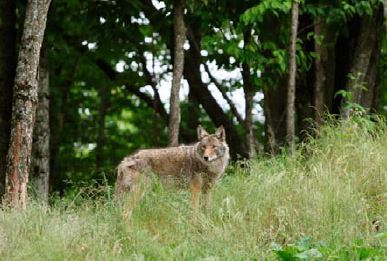
Life in Rockwood includes the joy of suburban living on the banks of the Etobicoke Creek but as urban residents need to be aware, living near wildlife habitats require that we must also be vigilant of potential dangers associated with life on the edge, so to speak.
A few years ago my husband was walking our dog in the empty land between Audubon Blvd. and Tahoe Blvd., and was shocked when suddenly they were surrounded by five coyotes. Each year Mississauga Animal Services receives many reports of Coyote sightings within our City. The sightings range from ravine or fringe areas, like our own, to heavily populated residential areas. The Coyote has adapted very well to life in our City. They are able to live in close proximity with their human neighbours even though we are known to be their only natural predator. Coyotes are not known to cause problems to urban residents and they are very necessary for the control of small rodents.
In recent years, there have been several incidents in both Mississauga and in Toronto, where owners have had their pets snatched out of their backyards by coyotes. Last February, in response to concerns about coyotes, the City of Mississauga hosted a public information session. Residents were invited to learn about coyote biology and behavior in the urban context, and how to prevent or resolve human-wildlife conflicts. The role of property-owners, municipalities and the provincial government in dealing with wildlife was also discussed.
While there has been an increase in coyote population in Mississauga in the past few years, this should not be a grave cause for concern, say Ontario’s Ministry of Natural Resources officials. The current rise in the coyote population is part of the natural cycle, and while it has increased over the past few years, it is expected to decline in the next few years. However, coyotes are here to stay, so we must learn to co-exist with them by using preventative tips to discourage them from residential areas, the experts say.
Coyotes are intelligent, adaptable, curious, experimental and most of all opportunistic! As a rule they are also shy, cautious and nonconfrontational. They are drawn to places where they can find “easy pickings”. As creatures of habit they will frequent certain areas in search of food. Hunting in an urban area is a learned behaviour as is hunting domestic pets or coming in close proximity with humans. By using the preventative tips below we can learn to discourage them from our residential areas and avoid any negative interaction or conflicts.
Never feed coyotes! Do not leave any type of food outdoors for any animal including pets. Bird feeders attract birds, squirrels and rodents which may then in turn attract coyotes. Garbage should be stored in sealed steel containers and placed at the curb on the day of pick up. Never compost meat products. Do not house poultry or livestock in your yard. Keep companion animals indoors, never let pets roam at large, and walk dogs on a leash at all times! Yards should be enclosed with a solid wooden six foot fence to prevent coyotes from entering.
Stay away from areas where coyotes are known to frequent, especially during the key hunting hours of dusk till dawn. If you must walk in an area that is known to have coyote activity, it is suggested that you walk in small groups, carry a personal audible alarm, a bright flashlight or an umbrella you can open and close to frighten them away. Keep pets leashed at all times! If you are approached by a coyote stay calm and wait until they move on. If threatened, make loud noises or sudden movements to scare them off.
If you need advice concerning wildlife within the City of Mississauga, or if you observe an injured, orphaned or sick animal, contact a Wildlife Representative at 905.896.5862 during office hours. For an emergency call 905.896.5858 or 905.615.3000 after hours. For more information go to the City of Mississauga, click here.
*Please note this article was originally published in the Summer 2010 edition of The Rockwood Times.

